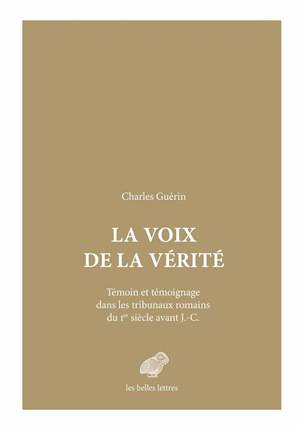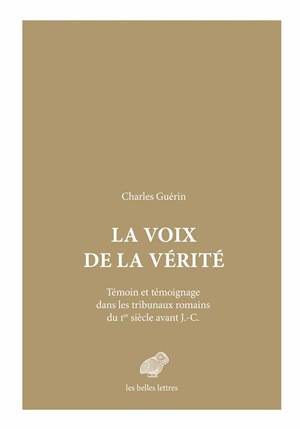
Je cadeautjes zeker op tijd in huis hebben voor de feestdagen? Kom langs in onze winkels en vind het perfecte geschenk!
- Afhalen na 1 uur in een winkel met voorraad
- Gratis thuislevering in België vanaf € 30
- Ruim aanbod met 7 miljoen producten
Je cadeautjes zeker op tijd in huis hebben voor de feestdagen? Kom langs in onze winkels en vind het perfecte geschenk!
- Afhalen na 1 uur in een winkel met voorraad
- Gratis thuislevering in België vanaf € 30
- Ruim aanbod met 7 miljoen producten
Zoeken
La voix de la vérité
témoin et témoignage dans les tribunaux romains du Ier siècle av. J.-C.
Charles Guérin
Paperback | Frans
€ 31,00
+ 62 punten
Omschrijving
English summary: Judicial testimony, deposed orally during an interrogatory which occurred at the end of the proceedings, is an aspect of trials in Rome neglected by Latin thinkers and philologists alike: the outcome of a trial - an occasion of profound eloquence as well as emotion - was thought to depend solely on the orator's speech. La voix de la vrit breaks away from this view by addressing testimony as the core component of a trial, reconstituting its steps, challenges and strategies, demonstrating that it provided judges with as many means to reach their decisions as do the closing arguments with which we are familiar. It thus reveals to us another dimension of Latin eloquence and a different purpose of orators by recomposing a genuine interrogatory rhetoric which calls for preparation, a method and unique strategies. As a result, trials can no longer be envisioned without taking into account these other speech alternatives: those of veridiction (for the witness affirming what he knows) and of questioning (for the interrogating orator). Lastly, the issue of the Latin relationship to truth and persuasiveness which transpires from the testimonial process, since the latter overturns the usual oratory postures. The witness can state or relate, but never demonstrate. French description: Depose par oral, au cours d'un interrogatoire qui prend place a la fin des debats, le temoignage judiciaire est un aspect oublie du proces a Rome, tant par les penseurs latins que par les philologues: le proces, lieu de la grande eloquence et des emotions, se gagnerait par le seul discours de l'orateur. Rompant avec cette perspective, La voix de la verite aborde le temoignage comme un element central du proces, en reconstitue le deroulement, les enjeux et les strategies et demontre qu'il fournissait aux juges autant - sinon plus - de moyens de prendre leur decision que les discours auxquels nous sommes habitues. Il fait ainsi apparaitre une autre dimension de l'eloquence latine, et une autre fonction de l'orateur, en recomposant une veritable rhetorique de l'interrogatoire, appelant une preparation, une methode et des strategies propres. Le proces, des lors, ne peut plus se concevoir sans que soit pris en compte ces autres regimes de discours, celui de la veridiction (pour le temoin qui affirme ce qu'il sait) et du questionnement (pour l'orateur qui l'interroge). Enfin, c'est la question du rapport latin a la verite et a la persuasion qui est posee par le biais du temoignage, puisque celui-ci renverse les postures oratoires habituelles. Le temoin declare, raconte mais ne demontre jamais. Le temoignage suppose par consequent un modele discursif tres problematique pour la rhetorique ancienne, celui d'un rapport a autrui fonde sur la croyance. Mais comment peut on croire autrui dans l'arene du tribunal, surtout quand celui-ci n'a ni le prestige ni l'autorite des grands nobles ou n'est, parfois, pas meme romain? Autrui peut-il dire le vrai, surtout quand il n'a pas les memes coutumes ou les memes interdits? Derriere les manoeuvres et les arguments, c'est la question de la romanite que fait surgir cette confrontation de l'orateur et de cet autre social ou ethnique qu'est bien souvent le temoin.
Specificaties
Betrokkenen
- Auteur(s):
- Uitgeverij:
Inhoud
- Aantal bladzijden:
- 424
- Taal:
- Frans
Eigenschappen
- Productcode (EAN):
- 9782251300023
- Verschijningsdatum:
- 15/05/2015
- Uitvoering:
- Paperback
- Formaat:
- Trade paperback (VS)
- Afmetingen:
- 150 mm x 220 mm
- Gewicht:
- 701 g

Alleen bij Standaard Boekhandel
+ 62 punten op je klantenkaart van Standaard Boekhandel
Beoordelingen
We publiceren alleen reviews die voldoen aan de voorwaarden voor reviews. Bekijk onze voorwaarden voor reviews.









